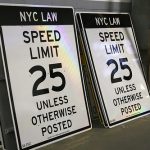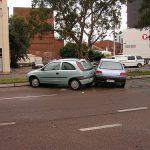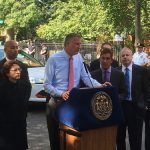How plumbers, the UPS, and people of color benefit from the NYPD’s slowdown
New York is nearing on the second month of one of the greatest law enforcement experiments in recent memory: what happens if police stop enforcing the law?
Since the NYPD’s slowdown began in the wake of the Liu and Ramos shooting – which police union chief Lynch blamed on the Mayor’s comments on race and law enforcement – courts have been shutting down early without enough criminals to bother prosecuting. The city’s parking enforcement has all but disappeared, with Gothamist suggesting that the drop in “quality of life” violations has accidentally ended racially biased policing in the Big Apple.

Delivery services, distributors and commercial drivers aren’t going to have to factor parking tickets into the cost of doing business until the NYPD slowdown comes to a close. Image from ZeroOne.
It’s striking that traffic enforcement agents have stopped doing their jobs – instead of being covered by the Patrolman’s Benevolent Association that (allegedly) called for the slowdown in the first place, TEAs (like sanitation enforcement agents) are members of CWA Local 1182, implying either sui generis solidarity or outright collusion.
We think the picture is a little more nuanced than Gothamist does, though. On one hand, sure, it’s hard to overstate the time and effort the city puts into ticketing delivery trucks, small-time freight, double-parked delivery vans. A 2013 article in Crain’s paints an ugly picture: lacking a formal system for managing delivery trucks and short-term commercial parking, the city assiduously tickets service providers like plumbers, who simply pay the tickets day after day and pass the costs on to their customers. Larger businesses like FedEx negotiate their tickets down, while smaller companies (which lack leverage and expertise) generally pay the full cost.
It’s easy to complain about this patchwork system, which turns what should be a fee into a law enforcement problem. At the same time, making the fee go away will result in congestion in the long run as drivers no longer have to factor the cost of parking into either car ownership or their transportation choices.
As Streetsblog has pointed out many times, New York City police already barely bother enforcing traffic laws, even when fatalities occur.
For now, though, the slowdown means that the small goods deliverers and distributors who don’t have access to the ticket-cheapening leverage of a major service provider like UPS or FedEx will see a few hundred dollars in their pockets at the end of this month. Last week, parking tickets were down 93% over the same week in 2014. (FedEx and UPS themselves will benefit, too, of course.)
That money will stay in the city, and that’s a good thing. But the city will have access to over a million dollars less in parking tickets for every day that the slowdown continues – not to reduced meter receipts as drivers figure out that no one’s checking to see if they’re parked legally.
To make matters worse, it’s unclear what might end the slowdown – upcoming contract negotiations between the PBA and city officials mean that the union has even less reason to negotiate than usual.
According to NYCLU, New York City were subject to 191,558 stop-and-frisk incidents in 2013; 56% of the frisked were black, while 11% were white and 29% Latino. Either black New Yorkers are five times more likely than whites to break the law, or there’s a disconnect between how crime is committed in New York City and how it’s enforced.
Along with plumbers, electricians, delivery people and FedEx, people of color should breathe easier for at least a few weeks, but when the costs of the police’s slowdown starts to hit city coffers, those same citizens may find that usually robust city services will have taken a hit.
Related Posts
Category: Legislation, Miscellaneous, Transportation

















